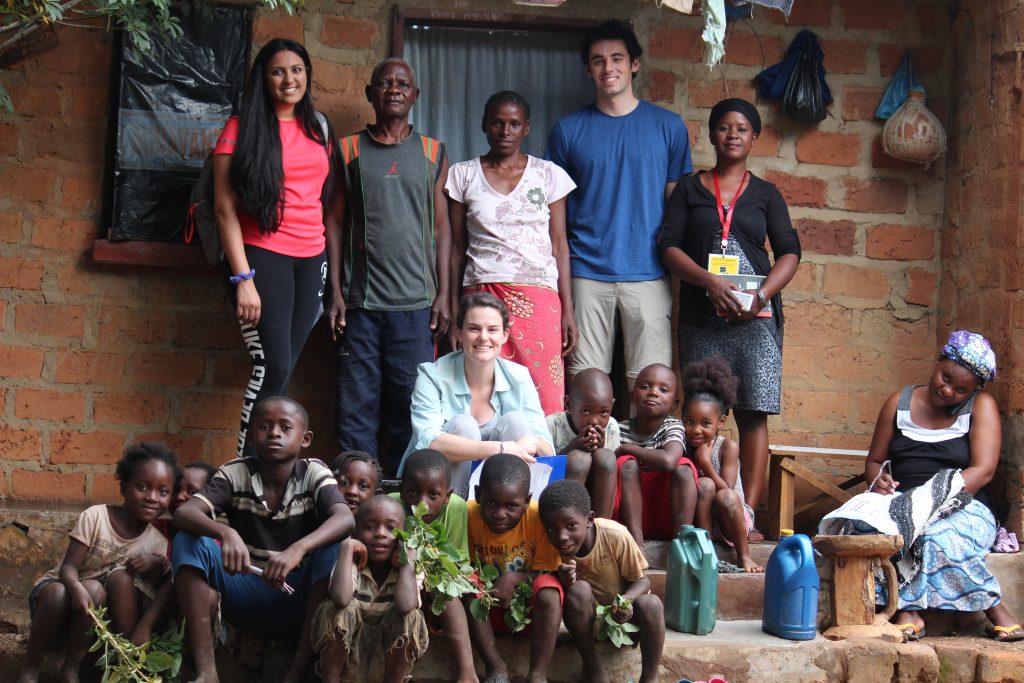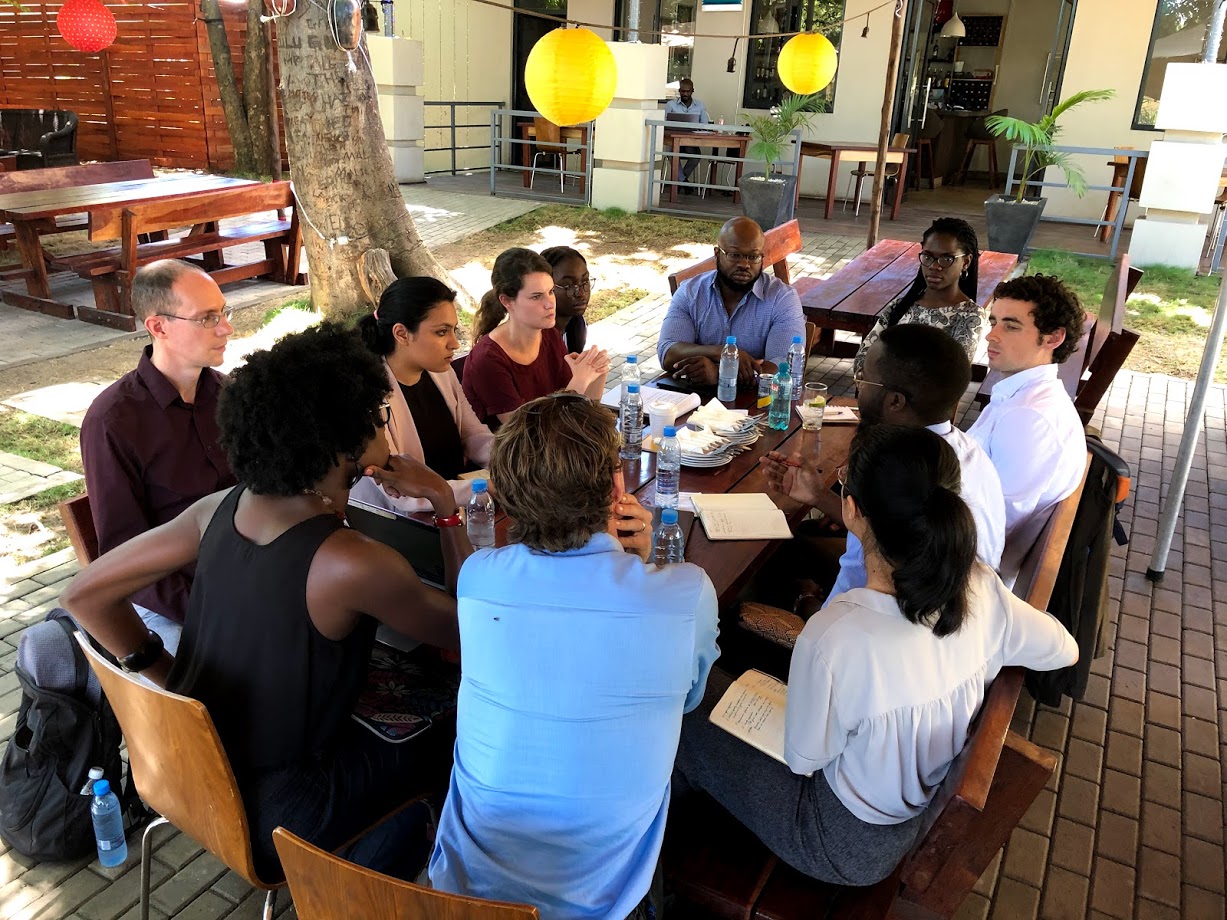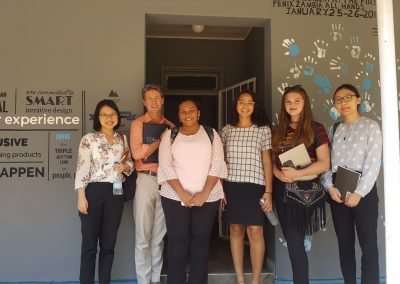Zambia: From the Ground Up

 Over the 2018-19 academic year, Duke faculty and students developed a series of pilot projects aimed at increasing understanding of the off-grid electricity market and improving system planning in Zambia. During two extended visits to the country, the group visited with more than 40 stakeholders from companies, NGOs, government agencies, the national utility, and donor partners working on power sector development. They interviewed households in four Zambian communities to better understand consumer energy needs. These visits, along with phone interviews with many other stakeholders and sector thought leaders, informed the three work streams outlined below.
Over the 2018-19 academic year, Duke faculty and students developed a series of pilot projects aimed at increasing understanding of the off-grid electricity market and improving system planning in Zambia. During two extended visits to the country, the group visited with more than 40 stakeholders from companies, NGOs, government agencies, the national utility, and donor partners working on power sector development. They interviewed households in four Zambian communities to better understand consumer energy needs. These visits, along with phone interviews with many other stakeholders and sector thought leaders, informed the three work streams outlined below.
The team received seed funding through Bass Connections, a Duke program that brings together faculty, postdocs, graduate students, undergraduates and external partners to tackle complex societal challenges in interdisciplinary research teams over the course of the academic year. The faculty and staff of the Energy Access Project at Duke—bringing diverse expertise from economics and data analytics to development finance and power system planning—led the project team, overseeing an interdisciplinary group of 7 Duke undergraduates and 5 masters students, who earned course credit for supporting the research. The team’s aim was to develop a network of key market participants and policy makers to help understand off-grid market dynamics, identify current and potential barriers to scaling off-grid platforms, and develop products and tools to support the market in addressing those barriers.
Willingness to Pay for Off-grid Electricity
A more detailed and geospatial understanding of customer demand for energy services and willingness to pay for them was one of the most frequent requests we heard from developers, investors, and donors, as this information informs both off-grid business expansion and broader system planning. The team identified a range of alternative approaches and evaluated the appropriateness of each, ultimately using a combination of qualitative and quantitative data.
Households and small businesses were interviewed and socio-economic data were collected. The goal was to get a sense of the energy use landscape in Zambia. Based on preliminary data collected coupled with a study conducted in Rwanda on willingness to pay for solar home systems, the team was able to extrapolate representative estimates of the willingness to pay for households in Zambia. The estimates were incorporated into a geospatial model, outlined below, so that users can understand how willingness to pay breaks down geographically.

Geospatial Model
An important challenge for private developers and electricity system planners is to identify the most appropriate technology – grid extension, minigrid or captive system – for providing electricity access to residential, business and institutional customers. Many criteria drive the technology selection, and scouting the relevant characteristics of individual areas is deeply resource-intensive. Given this context, the team created a web-based geospatial model and application to facilitate the process of site and market selection and allow users to identify appropriate expansion locations based on multiple criteria.
The application provides detailed information on public infrastructure (e.g. health clinics, railroads, roads, electricity transmission lines and distribution lines); population density and other demographic features; proximity to settlements; cellular phone coverage; protected area locations; the willingness to pay layer developed by the WTP Team; and other data. The application permits users to set their own priorities for balancing multiple selection criteria, depending on individual preferences and goals. A detailed user manual and a separate developer manual provides insight for model use and ongoing development.
Access Geospatial Model
Access User's Manual
Market Mapping and Policy Guidance
While not yet the hot bed of off-grid activity unfolding in Kenya and elsewhere in East Africa, Zambia is a country where commercial interest in the power sector is growing. Large unelectrified rural population, political will within the national government to improve access and reliability, donor interest, demand for power, and debt and other broad concerns related to the parastatal utility could make Zambia a fertile market for scaling off-grid platforms. The team identified the ecosystem of stakeholders, financing and assistance platforms, and key market barriers most relevant to the off-grid space. It then provided a deeper dive into selected areas where current or pending policy development could have major implications, initially examining these two issues:
- The role of results based financing (RBF) in scaling off-grid access and how to balance program efficiency with support for local companies. The Beyond the Grid Fund for Zambia has been a major force for catalyzing off-grid activity. Capturing lessons from the initial disbursement will be critical to keeping momentum in the short-term and ensuring a diverse and competitive sector over the long-term.
- An evaluation of the regulatory environment and trial standards recently established for minigrids. The team looked at how these are being implemented, what the ramifications have been for developers, and how they balance short term need for simplicity and low-cost with longer term concerns like grid integration.
Market Map for Off-Grid Solar Energy in Zambia


Field Experience Video
A student-produced video documented the team’s experience in the field in Zambia and highlighted the products that it developed.
Listen To Our Podcast
Three members of the team (Undergraduates Aashna Aggarwal and Miranda Wolford. Graduate student Sumin Wang.) were invited to the Policy 360 podcast to share their experience and takeaways from the year long project. Listen to them below:
- Rob Fetter. Senior Policy Associate with the Nicholas Institute for Environmental Policy Solutions at Duke University.
- Jonathan Phillips. Director of the Energy Access Project with the Nicholas Institute for Environmental Policy Solutions at Duke University.
- Subhrendu Pattanayak. Professor holding primary appointment in the Sanford School of Public Policy at Duke University, and secondary affiliations with the Duke Global Health Institute, the Nicholas School of the Environment, and the Department of Economics.
- Marc Jeuland. Associate professor holding primary appointments in the Sanford School of Public Policy and the Duke Global Health Institute at Duke University, and secondary affiliations with the Nicholas School of the Environment and the Pratt School of Engineering.
- John Fay. Instructor holding primary appointment in the Nicholas School for the Environmental at Duke University.
- Dalia Patiño-Echeverri. Associate professor holding primary appointment with the Nicholas School for the Environmental at Duke University.
- Robyn Meeks. Assistant professor holding primary appointment with the Sanford School of Public Policy at Duke University, and secondary affiliations with the Duke University Energy Initiative and the Duke Center for International Development.
- John Simpkins. Senior Lecturing Fellow holding primary appointment with the Duke Law School.
- Aashna Aggarwal
- Adaiya Granberry
- Ayo Balogun
- Evelyn Yun
- Harshvardhan Sanghi
- Ian Ferguson
- Kemunto Okindo
- Manfei He
- Miranda Wolford
- Rachel Wall
- Sumin Wang













